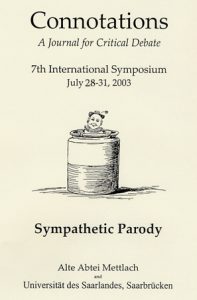Sympathetic Parody

In general, parody is considered as a potentially demeaning and mocking imitation of another text. Conversely, “Sympathetic Parody” emphasizes the positive connection or inner affinity between the original and the parody. For example, a parody may contribute to making a literary work a classic, and the mockery can expose how seriously an author takes the topics, motifs or linguistic forms that he takes up parodically. The parodist himself may be the target of his own persiflage. Apart from this, there also is, for example, “Sacred Parody”: a secular text is turned into a sacral one; flippancy is turned into earnestness. This thematic framework can account for a wide variety of article topics: from Shakespeare’s parodistical imagination of Falstaff to the double structure of mockery and sympathy in Gulliver’s Travels, to David Mamet’s self parody, and parody as a form of cultural memory in Science Fiction.
Articles in this special issue
- Spenser's Parody
Donald Cheney
Connotations Vol. 12: 1-13 - Elizabeth Bishop's "The Prodigal" as a Sympathetic Parody
Frank J. Kearful
Connotations Vol. 12: 14-34 - Shakespeare's Falstaff as Parody
Arthur F. Kinney
Connotations Vol. 12: 105-25 - Parody, Satire and Sympathy in Don Quixote and Gulliver's Travels
David Fishelov
Connotations Vol. 12: 126-38 - Parody as Cultural Memory in Richard Powers's Galatea 2.2
Anca Rosu
Connotations Vol. 12: 139-54 - Parody, Paradox and Play in The Importance of Being Earnest
Burkhard Niederhoff
Connotations Vol. 13: 32-55 - “Across the pale parabola of Joy”: Wodehouse Parodist
Inge Leimberg
Connotations Vol. 13: 56-76